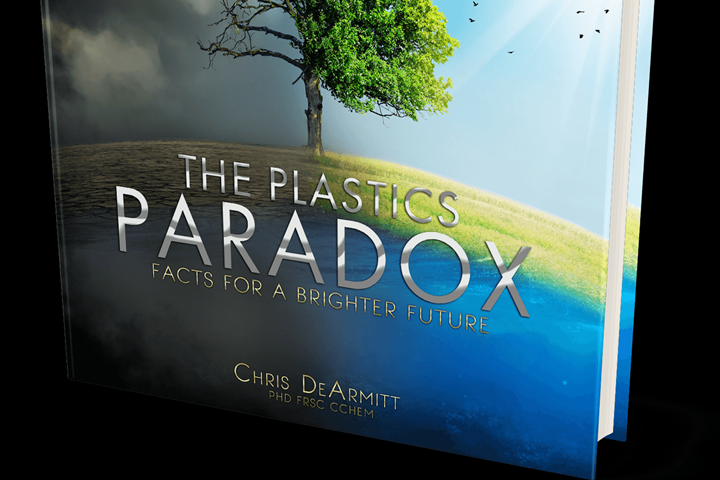Comprehensive, Scientific Overview of Plastics and the Environment
Veteran plastics materials scientist tackles waste, litter, microplastics, degradation and other related topics in his book The Plastics Paradox
A veteran plastic materials scientist and president of Cincinnati-based has used a scientific approach to debunk most of the negative public perceptions of plastics over the last decade or so. Chris DeArmitt, PhD, FRSC has self-published The Plastics Paradox: Facts for a Brighter Future, for which a condensed version can be viewed at plasticsparadox.com for free, with an unabridged version available through Amazon.
In a recent brief discussion with Chris, he characterized most people’s current beliefs about plastics as untrue and nothing more than internet gossip. “The headlines and articles we read are not supported by science and evidence. I know because I’ve spent over 1000 hours reading the peer-reviewed science to make sure that the facts were solid, and it tells a very different story.” His approach of this well-researched endeavor-- based on over 2000 scientific articles and reports, aims to introduce the science to the public, educators, and journalists “who care enough about the environment to spend a few minutes learning the truth.”

Chris has a multitude of granted patents as well as numerous articles, book chapters, encyclopedia chapters, and conference presentations to his name. He is an award-winning keynote speaker on plastic materials, environment, and innovation-related topics. “I don’t care if people are against plastics based on the facts, but at present people are against plastics based on clear, unsubstantiated lies. That’s a problem because we need to start with the truth if we are going to make wise decisions for a brighter future. If you care, then please look at the evidence and then decide. If you don’t, then you will be harming the environment by making poor choices,” he emphasizes.
According to Chris, The Plastics Paradox may well be the first comprehensive, scientific overview of plastics materials and the environment covering waste, litter, microplastics, degradation and other related topics. The book was just translated into Italian by the Italian plastics association, the German translation has been started by a plastics company, and the Spanish one is now underway. “I never expected people would like it so much that they’d spend their own time and money on translating it.
Chris’s endeavor was at least partially spurred by his daughters telling him what they had learned in school about plastic. “To my horror, they had been taught clear, undeniable lies about plastic. I should not have been so surprised—after all, teachers are just members of the public, and they pick up their information from the same online sources we are all exposed to. However, it’s a serious problem when we start teaching our children lies. They will grow up and vote for policies based on those lies, and that is likely to have unforeseen—and unfortunate— consequences. So, what was the lie that triggered me? My kids were told that plastics take a thousand years to degrade. As someone who has spent my whole career as a plastic materials scientist, I know that’s a whopping lie.”
Chris addresses this myth and several others in his five chapters. After an introduction that clearly described what thermoplastics are and the role they play in our lives, he tackles the meaning of ‘green’, describes lifecycle analysis, and tackles the plastic bag and plastics soft drink containers in the first chapter. In the four subsequent chapters he addresses single-use products minimizing waste, design for recycling and reuse; litter on beaches, oceans and other waterways; microplastics; degradation of plastics and the 1000-year plastic myth; and the attack in the industry, exploring the lost Greenpeace credibility, government bans, biopolymers and biodegradable polymers, bio-based fillers, social media and the press, and concludes with the path forward.
Chris’ most recent YouTube video talk: The Great Plastics Distraction 2021: How Environmental Groups Have Misled Us, covers such topics as material use, waste, sea turtles mortality, whale mortalities, microplastic dust. The talk then compared the scientific finding to the narrative the public has been exposed to online and asks why the two do not match up. “If you care about the environment, then this a must watch because we need to base our policies and opinions on facts, not fiction, if we are to create a brighter future for our children,” he notes. Take a look!
Related Content
ICIS Launches: Ask ICIS Generative AI Commodities Assistant
Said to be the first of its kind, this AI assistant will enhance access to ICIS’ intelligence and insights for the energy and chemical markets.
Read MoreThe Fantasy and Reality of Raw Material Shelf Life: Part 1
Is a two-year-old hygroscopic resin kept in its original packaging still useful? Let’s try to answer that question and clear up some misconceptions.
Read MorePolymer Showdown — PPO vs. PA66: May the Best Material Win
Second in a series, an expert from plastics engineering consultancy The Madison Group pits leading thermoplastics against each other to see how they differ in processing characteristics, chemical resistance, thermal and mechanical performance, and more.
Read MorePolymer Showdown — PC/ABS vs. PC/PBT — May the Best Material Win
First in a series, experts from plastics engineering consultancy The Madison Group will pit leading thermoplastics against each other to see how they differ in processing characteristics, chemical resistance, thermal and mechanical performance, and more.
Read MoreRead Next
Lead the Conversation, Change the Conversation
Coverage of single-use plastics can be both misleading and demoralizing. Here are 10 tips for changing the perception of the plastics industry at your company and in your community.
Read MoreMaking the Circular Economy a Reality
Driven by brand owner demands and new worldwide legislation, the entire supply chain is working toward the shift to circularity, with some evidence the circular economy has already begun.
Read MoreFor PLASTICS' CEO Seaholm, NPE to Shine Light on Sustainability Successes
With advocacy, communication and sustainability as three main pillars, Seaholm leads a trade association to NPE that ‘is more active today than we have ever been.’
Read More












